an antique millennial broadcasts confused nostalgia for her gay youth
Don't wanna be here? Send us removal request.
Text
Ce que j'ai fait, ce soir-là (Meld, s2 e16)
Let me begin this review with a compliment sandwich - "Meld" is an episode that packs a lot of acting chops. Our guest star is everyone's favorite weird little guy, Brad Dourif, paired with a really compelling performance from Tim Russ, who at last gets to demonstrate his range. Watching these two together is a treat!
I came to “Meld” with a lot of prejudgment, insofar as I belong to the You’re Wrong About school of media criticism and am skeptical of pop culture portrayals of criminality. Violent behavior is a sad and fucked up consequence of people being people, but I find that our attempts to depict violence in fiction usually say more about our hunger for monsters than about real-life monstrous behaviors.

We open in Sandrine’s, where the Voyager crew is making their own fun by betting on the outcomes of on-board particle counts. Thus begins a tedious multi-episode arc for which the viewer experience can be summed up as, “Tom Paris is a dumbass, but a boring one.” Eventually Chekhov's dumbass will go off, but until then, watching Paris get up to illicit shenanigans is so dull. Why can't this man adopt the persona of an interesting bad boy? The whole thing lands real weird in the aftermath of the "dear god, go to therapy" storyline of "Threshold."
The mood is lightened by the news that there’s been a murder on Voyager! There’s no sleuthing required, as only one person, Lon Suder, was at the scene of the crime. It turns out that Chakotay failed to share that one of his crew might be a serial killer (oopsy-doops). I feel like the fact that none of the former Maquis have passed a recent psych eval should have come up before now. Instead, intimations that they might not be thriving surface only occasionally, as in “Learning Curve” or “Meld.”
Suder confesses to his crime, and Tuvok and the EMH discuss his behavior, in a scene that betrays ignorance of even 90s-era psychology. “Psychosis” is considered, but only one possible diagnosis is mentioned: “bipolar disorder.” This feels pretty damn harmful at a time when there was so much stigma against a bipolar diagnosis. Based on Kes’s analysis of his medical history, the Doctor finally diagnoses Suder with, wait for it, “violent impulses.” Later, Tuvok describes him as having “an incredibly violent nature.”
I was frustrated by the choice of Suder for this case study of habitual violence. Are there people out there who are hyperviolent, don't have mental health disorders or known trauma histories, and can successfully mask their behavior for years at a time? Possibly - I am not a psychologist. But I don't think people like Suder are the norm. Why do we fixate on people with serial killer vibes when the abusive husbands-next-door are right there?
Apparently 24th-century medicine has no tools for treating anger management issues, so Tuvok proposes a mind-meld to share his emotional self-regulation techniques with Suder. I guess this is like Vulcan DBT? As a result, Tuvok starts to experience Suder’s violent thoughts. It’s an acting treat for Tim Russ, who delivers a compelling performance in which our even-keeled lieutenant commander absolutely loses it.
Suder, meanwhile, begins to find equilibrium. As a result, he wants to keep melding, and somehow makes it very sexy in a way that no one asked for. “Penetration,” he tells Tuvok, describing a mind meld. “Your will dissolving mine. The joining.” In response, the EMH kink-shames: “Anybody with an ounce of sense wouldn't share his brain with someone else. Would you? I certainly wouldn't.”
What makes Tuvok’s uncontrolled anger interesting is the way that it intersects with the question of criminal punishment. Early in the episode, Tuvok suggests capital punishment as a possible solution for Suder. After all, Voyager (which, again, apparently has no treatment for Suder's emotional problems) can only offer lifelong incarceration as a solution.
Now that Tuvok is full of rage, he's obsessed with the desire to violently punish Suder. The idea that criminal punishment is a manifestation of our animal aggression is certainly an interesting thesis, though I suspect it’s a lot more complicated than that.

“Meld” has some great acting and tries to address Big Human Questions. Maybe we weren't sure how to formulate those questions in 1996, or maybe I'm just not the right viewer for this episode.
3/5 radiogenic particles.
16 notes
·
View notes
Text
gotta make way for the homo superior (Threshold, s2 e15)
Happy Threshold, y’all. I have decided the notes I took on my phone are funnier than any polished review I could write for this episode, so that is what you are getting.
This is the one where Robert Duncan McNeill chews the scenery for 45 minutes with the aid of his makeup artists, all in service of an incoherent B-movie of a storyline. Have fun!
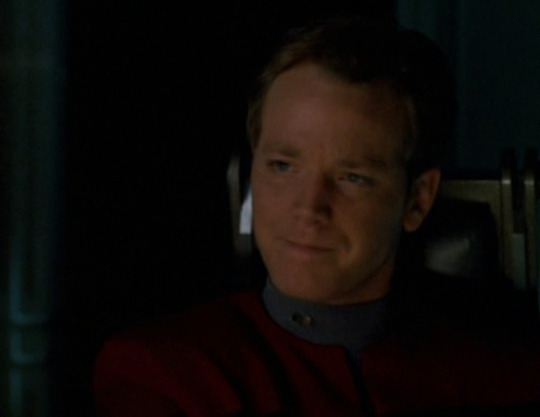
[oh, and content warning for tongue-themed body horror, it's genuinely horrendous]
What is the coffee actually made of
Their solution to engineering issue seems really simple?
Oh no he has LEGS I hate it
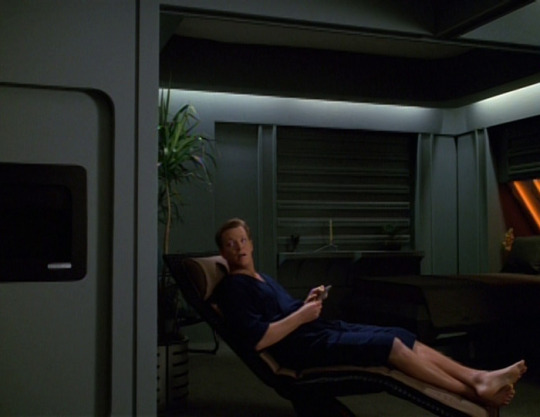
[the legs in question. yikes. nice chair though]
I literally do not care about Toms white boy ego
She shouldn't let him do it!!!
Kim is a good friend & cheering [sic?]
Dr shouting is iconic - I'm glad you had a good time
Stellar Cart, the unsung heroes
Who is this medical team?
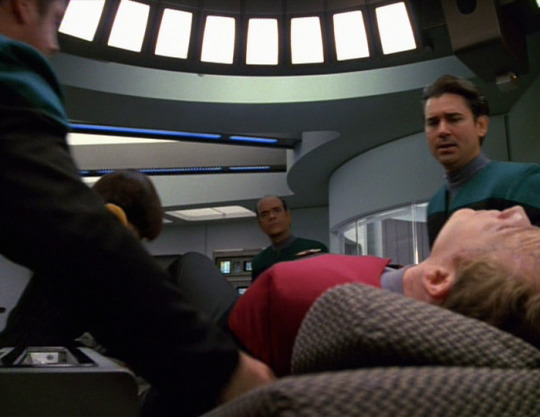
[no really, WHO ARE these guys]
Problem - we don't like him! I don't care if he suffers!
Tom's monologues are just annoying and self involved - a deeply immature man who needs to deal w his shit
Oh right Kazon subplot
I actually think his acting is pretty good, he's just a character who hasn't been given enough for this to work
NO INE NEEDED TO SEE THAT
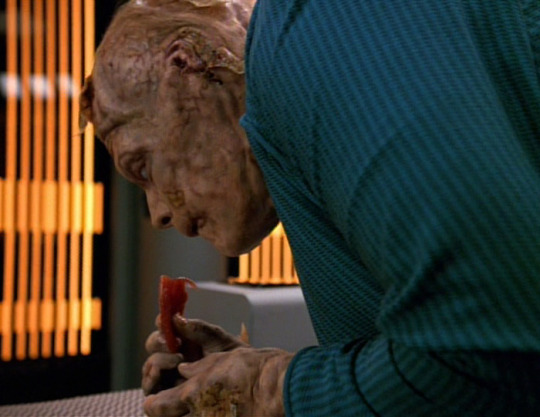
[nooooo. everyone's nightmare fuel for the week]
Actually just torturing Paris for 45 minutes
The security lighting is so wild
I don't think these lizard babies are consensual
Whyyyyyy does a woman need to get kidnapped in this plot

[excuse me sir, get your mutant lizard paws off of Janeway]
THAT'S NOT HOW EVOLUTION WORKS
J looking like someone who has been through some SHIT

[same, girl]
why is she being funny about this?????? And chill? This is disturbing?
And Paris goes back to talking about himself, so wild
IS HE GOING TO GO TO THERAPY

[and we shall never speak of these things again]
2.5/5 pepperoni pizzas with Kavarian olives, because honestly, I’ve had worse times.
#resharing because I accidentally posted to private#if only brannon braga had done the same with the script
3 notes
·
View notes
Text
gotta make way for the homo superior (Threshold, s2 e15)
Happy Threshold, y’all. I have decided the notes I took on my phone are funnier than any polished review I could write for this episode, so that is what you are getting.
This is the one where Robert Duncan McNeill chews the scenery for 45 minutes with the aid of his makeup artists, all in service of an incoherent B-movie of a storyline. Have fun!

[oh, and content warning for tongue-themed body horror, it's genuinely horrendous]
What is the coffee actually made of
Their solution to engineering issue seems really simple?
Oh no he has LEGS I hate it

[the legs in question. yikes. nice chair though]
I literally do not care about Toms white boy ego
She shouldn't let him do it!!!
Kim is a good friend & cheering [sic?]
Dr shouting is iconic - I'm glad you had a good time
Stellar Cart, the unsung heroes
Who is this medical team?

[no really, WHO ARE these guys]
Problem - we don't like him! I don't care if he suffers!
Tom's monologues are just annoying and self involved - a deeply immature man who needs to deal w his shit
Oh right Kazon subplot
I actually think his acting is pretty good, he's just a character who hasn't been given enough for this to work
NO INE NEEDED TO SEE THAT

[nooooo. everyone's nightmare fuel for the week]
Actually just torturing Paris for 45 minutes
The security lighting is so wild
I don't think these lizard babies are consensual
Whyyyyyy does a woman need to get kidnapped in this plot

[excuse me sir, get your mutant lizard paws off of Janeway]
THAT'S NOT HOW EVOLUTION WORKS
J looking like someone who has been through some SHIT

[same, girl]
why is she being funny about this?????? And chill? This is disturbing?
And Paris goes back to talking about himself, so wild
IS HE GOING TO GO TO THERAPY

[and we shall never speak of these things again]
2.5/5 pepperoni pizzas with Kavarian olives, because honestly, I’ve had worse times.
3 notes
·
View notes
Text
the best allies we could have (Alliances, s2 e14)
If Voyager’s Kazon arc has a peak, it’s “Alliances.” Here it is, the dramatic turning point in our understanding of Delta Quadrant politics! This episode has a kernel of something almost compelling, but like much of season two, it’s sadly undercut by storytelling failures.
We cold-open on a firefight with the Kazon. Star Trek battle scenes are so silly; why do the consoles explode? I guess the claustrophobic mayhem is a holdover from the nuclear submarine aesthetics of TOS. I will never not be amused by how Janeway’s hair explodes every time they’re in a fight. Are there no bobby pins in space?
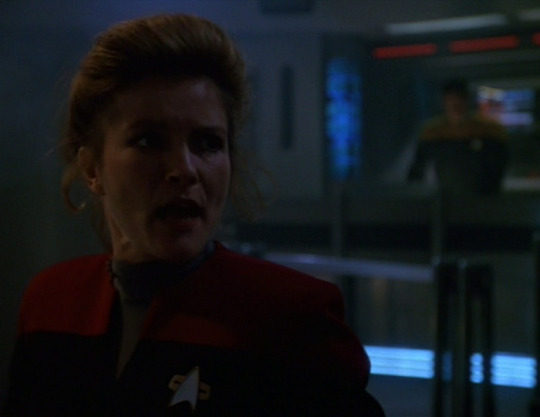
A crewman dies in the battle, and we learn that two more have died in previous Kazon encounters, our first casualties since Durst got de-faced (lol) by the Vidiians. The tension is real - redshirt deaths hit differently when a small crew has trauma-bonded in space.
A faction of the crew wants to buy off the pursuing Kazon with Federation technology, but Janeway won’t turn her back on the Prime Directive. The Starfleet/Maquis divide, usually an afterthought, feels momentarily real. We’re treated to a three-way debate between Janeway’s lawful good authoritarianism, Chakotay’s collaborative ethos, and Tuvok’s detached realpolitik. “This isn’t a democracy, Chakotay, I can’t run this ship by consensus,” Janeway says, briefly inviting a utopian, communitarian vision of a Voyager actually run by consensus. But even she’s swayed by Tuvok’s (frankly, bullshit) suggestion that a temporary alliance with the Kazon has the potential to make the Delta Quadrant more stable as long as Voyager doesn’t actually hand over technology.
This is arguably a weak leadership moment for Janeway, who can’t adapt to the demands of her environment or crew, but maybe it’s okay to be a rules-y Taurus if you surround yourself with people who correct your worst impulses.
Janeway reaches out to Seska to try to broker a deal, which is fun because it’s genuinely unexpected and makes Chakotay so squirmy. Meanwhile Neelix makes contact with a Kazon acquaintance. They meet up in what I believe is the first “hive of scum and villainy” of the series. You know these people are up to no good because there are alien bikini girls!
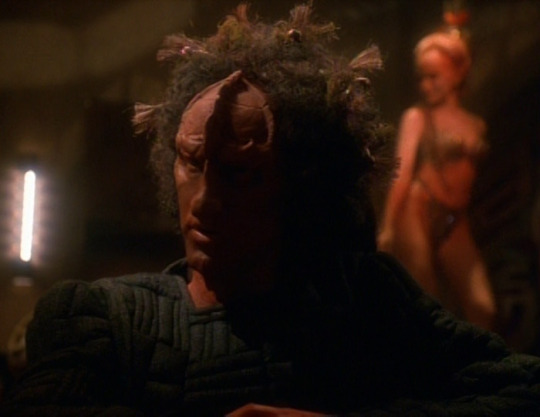
Here Neelix encounters the Trabe, another local alien species who have their own story to tell. The episode both becomes interesting and loses the plot completely.
The Trabe tell Voyager that “over thirty years ago,” they enslaved the Kazon in an apartheid society. When the Kazon rose up, the Trabe lost everything. Now the Trabe are a landless people still persecuted by those they oppressed, even though decades have passed and many of the Trabe were children when the Kazon overthrew them.
Janeway is delighted - instead of allying with the Kazon, they can ally with the friendly Trabe! Chakotay agrees - the Trabe, after all, have openly acknowledged the harm their people caused.
Meanwhile, me: OMG NOOOO THEY FOUND WHITE PEOPLE IN SPACE
Previously I wrote about the Kazon as a parable for midcentury US race relations. Before I rewatched “Alliances,” I genuinely thought they were just clearance-rack racialized space baddies, but here the parallels to white Boomer experiences of the 1960s uprisings are unmistakable. It’s a resonant scene, but watching our command team fall over each other to befriend their new pals is… stressful.
The Trabe build on Janeway's proposal: together they’ll bring the Kazon together and negotiate for peace. But when the meeting begins, the viewer can’t help but notice that the Kazon seem like the most reasonable people in the room. They don’t trust the Trabe or Janeway, and they have a much better read on the power dynamics at play than Janeway does. Because the meeting is a fucking trap.
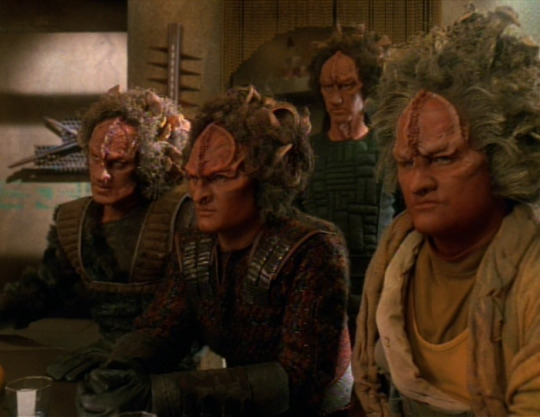
This episode is such a bummer. Maybe I'm being too charitable, but it feels like a genuine attempt at anti-white supremacist storytelling that missed the mark. Janeway, our audience surrogate, is presented with a complex political situation and immediately latches onto the group she identifies with: white-presenting people who have claimed the moral high ground after centuries as oppressors. Then the rug is pulled out from under her. White liberalism as a facade for violence is a very mid-nineties dynamic.
The full impact of this plot twist relies on the viewer sharing Janeway’s white myopia. If you don’t implicitly trust the Trabe (or the writers), you spend the whole episode screaming at the television. Why are our protagonists so clueless?
“I hope there's a lesson for all of us in this,” Janeway says in the final scene. “Although some of the species we've encountered here have been peaceful, others seem governed only by their own self-interests.” It’s not a good look when our hero has traveled 70,000 light years to learn that… politics are a thing? And why didn’t her command team didn’t save her from herself? Are you telling me that Chakotay, the Indigenous anti-authoritarian militant, is this politically naive?
If “Alliances” is at times a smart portrait of how an oppressor mindset operates, it’s undermined by an offensive caricature of resistance. Violent resistance absolutely can be fueled by an ideology of separatism and racial hatred, but the Kazon aren’t a resistance movement; they’ve won. Yet the Kazon resemble white peoples' worst fears of postcolonial "failed states." It feels like the writers genuinely believe that the political and social problems of formerly dispossessed people are of their own making, not recognizing the ways that white supremacy and economic imperialism still actively shape the lives of formerly colonized peoples. The Kazon only make sense in a universe where the Trabe are still economically and politically exploiting them, and that's not the universe we're shown.
We needed an episode with this shape, one that sets up the hard political choices of later seasons, and I can accept that requires our characters to exercise truly poor judgment. But this attempt at gritty politics doesn’t feel grounded in anything real, and the result feels disappointingly thin.
2/5 triangular tables.
13 notes
·
View notes
Text
Neelix, I need another pot of coffee (Prototype, s2 e13 & Dreadnought, s2 e17)
I don't have much substantial to say about "Prototype" or "Dreadnought," two enjoyable robot-of-the-week episodes that center on Torres delivering compelling technobabble to a machine for 45 minutes. They are both extremely watchable, and "Protoype" especially worked for me with its first contact moral quandary premise, which felt straight out of pulp science fiction in the best way. And who doesn't love an android who looks like they shop at LL Bean?
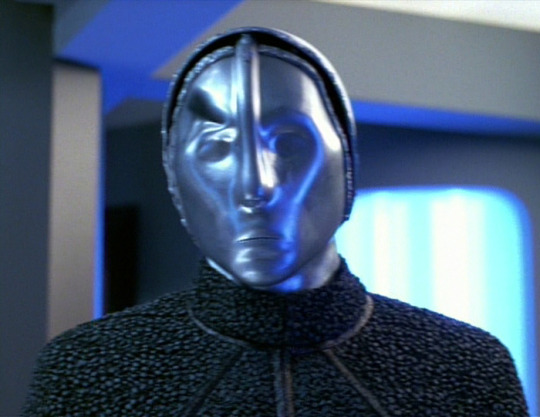
So instead this is going to be a meditation on science fiction depictions of women in STEM, and why they seem to be so deeply lodged in my psyche.
The first adult novel I ever bought was Contact by Carl Sagan. This was at my middle school's Scholastic book fair. When I think about my twelve-year-old self I immediately remember that mass-market paperback, which in some hard-to-pin-down way summed up all my aspirations for my future adult life.
I'd encountered Contact as a hardcover book at a relative's house a year or two earlier. For those not in the know, it follows an astronomer who detects a first contact transmission. The book spends a lot of time imagining the political and social impacts of discovering extraterrestrial life, as well as the challenges Ellie Arroway faces as a woman in her field.
In the space of a weekend, I raced through the book but didn't have time to finish it. Soon after, the film came out, and I saw it in theaters. It was a movie that felt like it had been made specifically for me (aliens! science mysteries! an extremely hot Jodie Foster!)
My relationship with science and STEM is contradictory. As a kid growing up watching Star Trek and reading Madeleine L'Engle (shout-out to my other formative science girl, Meg Murry), I was so hungry to learn more about astronomy, programming, math, and electronics, but I never seemed to get my hands on those opportunities. This was before "STEM" was popularized as an acronym, and casual opportunities to be a kid science nerd were slim. At the same time, it was the "post-feminist" 90s, and I was never particularly conscious of being excluded from the sciences due to my gender.
As I grew older, my main STEM interests were web design (as evidenced by many lovingly hand-coded early-2000s websites) and microbiology (I am still filled with rapture whenever I contemplate protein synthesis). I also harbored a deep and all-encompassing love for the Museum of Science in Boston. But my career aspects were mostly in the humanities or social sciences, and I never got around to taking a formal programming class. As I became an adult, I stopped running Linux on my laptop or freaking people out at work with my DVORAK keyboard setup. I drifted away from a conception of myself as that kind of nerd.
It's natural for interests to shift as we age, but something about this particular transition felt devastatingly final to me. STEM is a closed world that doesn't welcome casual interest. There is almost no space for adult women to dabble in a STEM hobby. Science museums are for children, and popular nonfiction about physics and math are, implicitly, for men. (Earlier this month I watched some Youtube videos about astronomy, and immediately started seeing gun advertisements.)
I sometimes think that what I enjoyed as a kid was the aesthetic of science - in other words, the reason we consume science fiction in the first place. Why do we love a science girl? For me this attraction feels very extremely gay, though others' mileage may vary. "Scientist" is, yes, traditionally a male-coded role, but to young me, it felt like a means to escape gender roles entirely. Science girls and science queers are smart and curious and independent; they are hungry for adventure and have no time for your societal expectations.
When Voyager came out, there were virtually no shows that featured multiple women working in the sciences (outside of medical shows). But for me, a kid reading and watching science fiction, it was normal. Roxann Dawson complained that most of her episodes in early Voyager are her alone in a room talking to a robot/missile/herself, but she's very good at it! The troubleshooting scenes feel lived-in and naturalistic, especially in the way they portray her satisfaction from solving a technical problem. She's so tickled with herself when she achieves a breakthrough! I felt similarly when I mastered the art of inline CSS in the year 1999.
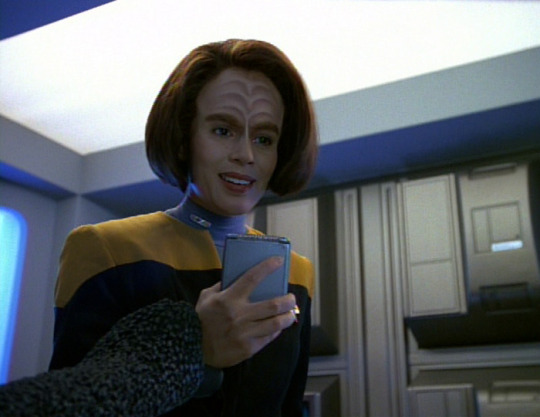
Science fiction that accurately portrays the experience of working with technology is rare, and to be clear, Star Trek doesn't always bother. But Voyager seems genuinely interested in dramatizing problem-solving and collaboration skills - scientist as something you do, not something you are.
I still use my computer skills at my day job, and while I don't work in the sciences, I like to think that the way I move through the world owes something to all the hours I spent as a kid imagining myself into starships and astronomical observatories.
And with that, I'm off to watch some more videos about the twin paradox.
4/5 power modules.
5 notes
·
View notes
Text
where are your troubles now? forgotten? (Resistance, s2 e12)
(POV you’re watching the Barbie intro but it’s Star Trek screenwriters. Please indulge me.)
Once, in another century, there was a show called Star Trek Voyager. (Cue 2001: A Space Odyssey music.) A lady and two dudes created it. Occasionally other ladies cowrote episodes. But by the time Season Two rolled around, there were not so many ladies. Actually there was just Jeri Taylor, and by god she tried. But one lady cannot be all things to all people.
Then in November 1995, a great miracle happened. A new lady was hired to write a teleplay. It was fresh, inventive! Something was happening!
Her name was (music crescendos)
L I S A K L I N K
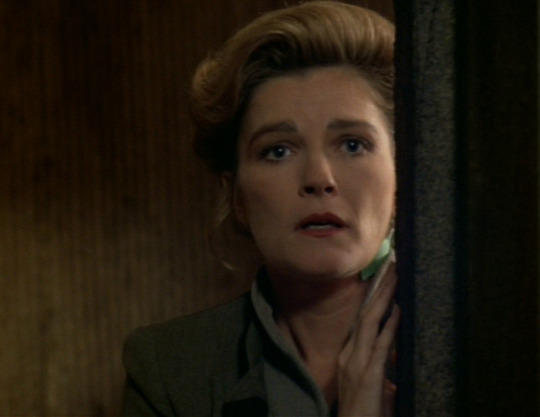
I don’t know much about Lisa Klink, except that “Resistance” marks the beginning of her multi-season involvement in Voyager, and that she was a five-time Jeopardy winner. (I do not watch Jeopardy, I would not be good at Jeopardy, but Jeopardy people are nevertheless my people.) Mostly I know that I turned on “Resistance” and, despite my general disinterest in the show’s production history, immediately asked: who the FUCK wrote this?
“Resistance” is not a perfect episode, but after half a season of flailing, it is a revelation. Klink, writing the script for a story by Michael Jan Friedman and Kevin J. Ryan, has a clear vision of what Voyager can be - a show that’s grounded, emotionally resonant, and trusts its actors.
I am partial to the gritty, Blade Runner-inflected, Firefly/BSG brand of science fiction television, so when we started in media res, our heroes in civvies doing deals in an outdoor market, I died and went to cyberpunk heaven. (Neelix’s coat alone is worth the price of entry.) Instead of swanning across the galaxy like tourists in a slightly under-resourced cruise ship, the Voyager gang are finally the scrappy underdogs they ought to be.
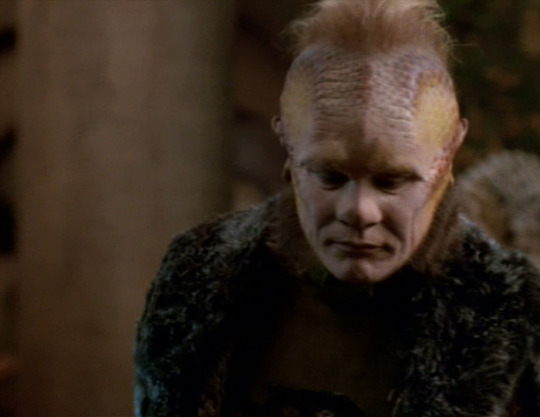
This is our second Janeway episode of the season, and the first episode, perhaps of the series, that really gives her a character mandate beyond “strong but feminine captain who loves her dog.” Mulgrew has her work cut out for her, acting against JOEL FUCKING GREY, but they’re both marvelous. Waking in the home of the enigmatically batty Caylem (in a claustrophobic sequence whose stagey absurdism recalls a Beckett play), Janeway slowly grows to understand that Caylem, who’s decided she’s his daughter, might be her best ally for escape. The growing emotional connection between the two is so tender and understated; as a writer, Klink has mastered the light touch.
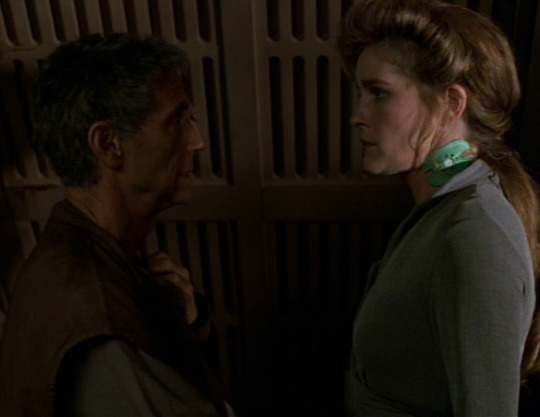
Janeway and Caylem end up collaborating with the local resistance movement to rescue Torres and Tuvok, who have been imprisoned by the lawful evil overlords of this world. Our characters genuinely feel like they are in big trouble! Torres and Tuvok’s prison stint is rough. (I did enjoy B’Elanna’s beatnik dissident prison garb. She looks like it is approximately 1956 and she is a French student who has been arrested for throwing a baguette at a cop.)
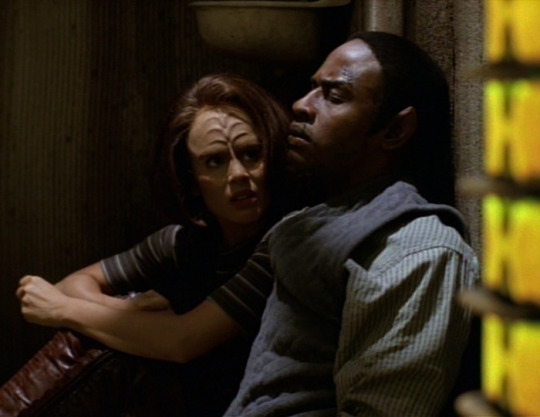
The only weak sequence is the prison break itself, which feels too easy and relies on a tired “sex worker disguise” subterfuge. But the ending is so satisfying and will break your heart.
Once Janeway’s back in uniform, it feels like we’ve truly been on a journey, one that brings to mind iconic episodes like “The Inner Light.” Voyager is a long way from home, and I want these characters to go through transformative experiences. The boldness of this episode gets us a little bit of the way there.
A radical reimagining of Voyager, and the best episode of season two in my estimation. I award this one 4.5/5 melon hats.
30 notes
·
View notes
Text
five by five? five by five what? (Manuevers, s2 e11)
Let the Seska arc hate watch commence! I do not remember having a good time watching Season Two, but considering the volume of notes I took while watching these episodes, I seem to have wrung some joy out of it.
We open with Chakotay and B’Elanna bickering after a hoverball game. I love that this episode opens on a friendship moment for the two of them, though the vibe frankly feels a bit flirty when viewed so soon after “Persistence of Vision.” I guess the writers are just reminding us that they're pals, but I am coming to this script with a high level of mistrust.

Voyager has a random encounter with a probe/nebula combo that turns out to be a Kazon attack. It feels like there are four shapes for the opening scenes of Voyager episodes - random alien encounter, gather resources, try to get off Gilligan’s Island, fight a cloud. The result is a formula that easily has the makings of a 45-minute collaborative board game.
The Kazon dramatically board the ship and steal a transporter module. The attack has been orchestrated by Seska, now visibly Cardassian and also at her vampiest, trying to consolidate power among the Kazon in a bid to get home. Chakotay is pissed! Tuvok is catty to him about it, which made me smile. It is goofy boys o’clock on Starship Voyager.
Chakotay decides to run off in a shuttle and confront Seska, leaving poor B’Elanna to play “man whisperer” and explain his motivations to Janeway. It would have been nice if we’d seen any of these alleged motivations firsthand, but instead we just get a vague sketch of a "strong but silent," emotionally fragile man trying to play the hero and protect his dignity.
I enjoy Chakotay and Janeway being at odds, but gods, not like this. Chakotay's relationship with Seska is dull as dishwater, and all of Seska’s on-screen time feels one-note. Cardassians are fun; a lone Cardassian running around the Delta Quadrant getting up to maximal shenanigans ought to be a hoot! So why am I so bored?

Maybe the problem is Chakotay’s conversation with Cullah. Chakotay warns Cullah not to trust Seska, whom he characterizes as a dangerous femme fatale. Okay, so we are in melodrama territory. If Seska is a wily temptress instead of a fully realized person, why did Chakotay, an extremely grown man, fall for it? Who is this guy?
At the end of the day, I think my problem is that Chakotay's adult backstory is unrealized. So much of this character’s arc relies on the conceit that he’s overcome huge personal deficits since joining Voyager, but when? How? He doesn’t read as a messy renegade who’s reformed, he comes off as an extremely mature guy who, with minimal fuss, slotted right into Janeway’s Starfleet crew. Any chemistry with Seska, or potential for real drama, doesn't make it to the screen.
Voyager wins the day, Janeway is pleasingly disappointed with Chakotay (and calls him a cowboy, which is both funny and extremely rude), and we are treated to THE WORST ENDING: a paternity plot that literally no one asked for.
The last note I jotted down was “No one writes Seska fanfic*,” which I think gets at the heart of my contempt for this character. If the purpose of a Star Trek is to vicariously have adventures in the company of a lovable ensemble cast, Seska is a reminder that the writers have failed. We can't even love to hate her, and it's such a bummer.
1/5 quantum resonance oscillators.
*this is a rhetorical point, please do not correct me with AO3 links
1 note
·
View note
Text
how do you solve a problem like Chakotay? (Tattoo, s2 e9)
I have been away from this space for a number of boring reasons (including, to be transparent, cheating on Janeway with my space cop boyfriend Odo. Why do the good girls go for the lawful neutral boys?)
But also, Tattoo! Yikes on bikes! When I first realized I’d be reviewing this episode, I felt a powerful impulse to back away slowly, as if from wasps. My aversion came from a place of contempt for this episode, probably the low point of the imaginative failure that is Chakotay. At the same time, I was not sure what to do with my anger. It’s easy for white people to become a little too enamored with our own hot takes; I am ill-equipped to speak to the impact of a narrative that’s racist, anti-Indigenous storytelling all the way down.
I imagined I’d compile a reading list by Indigenous writers who could talk with authority about “Tattoo.” The reading list has become a comfortable rhetorical move for white cultural critics, a stay in our lane impulse. A reading list attempts to re-center marginalized voices, though it’s rarely a call to action (unless that action is read books). In this case, the reading list was elusive. I couldn’t find much non-paywalled content discussing this episode at length, with the exception of this illuminating review by comics artist Rob Schmidt.
What does it mean to do low stakes cultural criticism on Tumblr dot com? If this is a quiet space for playful self-reflection about my Television Feelings, then I think we can agree that nobody particularly needs my thoughts on the impact of “Tattoo,” or the Kazon, or any of the other ill-conceived ways that Star Trek has handled race. I will continue to get mad about these artistic choices, but my anger is not load-bearing. You can’t build anything with it.
The best I can probably do here, and throughout these reviews, is to excavate the contours of my own relationship with science fiction. I think white people have quite a lot we need to say about whiteness, and our penchant for racist science fiction, and how we could perhaps redirect our creative impulses elsewhere.
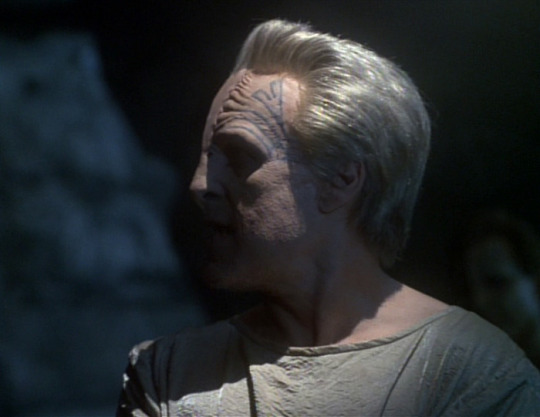
To summarize the episode - Chakotay visits a Delta Quadrant moon and recognizes a symbol that reminds him of a childhood visit to his people’s ancestral home on Earth. As a young man, nonconformist Chakotay wasn’t much interested in his ancestors’ traditional lifeways, and even now, he’s agnostic about some of their religious beliefs. Nearby, a planet has flora and fauna similar to the Earth rainforest Chakotay remembers visiting. When he’s separated from the away team, he encounters aliens who can “control the elements of nature” and seem to share his tribe’s culture.
In a block of decidedly clunky exposition, we learn that these aliens visited hunter-gatherers on Earth millennia ago. The early humans are described as having “no spoken language, no culture, except the use of fire and stone weapons.” Okay then! The aliens gave them “an inheritance, a genetic bonding so they might thrive and protect your world.” The genes motivated the hunter gatherers to travel to the Americas, where they passed down memories of the aliens, who became key figures in Chakotay’s people’s religion. Chakotay now understands himself, his father, and the aliens as people called to “honor the land” and defend it.
(Meanwhile, the Doctor programs himself to experience a respiratory illness and proceeds to have what I believe is known in the vernacular as a “man-flu.” It’s very silly.)
If “Tattoo” was well received, I think it was because of the emotional heft of this episode, which figures Chakotay as the diaspora kid who rediscovers his roots and connects with his father’s memory. I would have liked an episode that fully explored what it means to be Indigenous and diasporic, and how Chakotay’s identity informed his decision to join the Maquis.
This is not really the episode we got. Instead “Tattoo,” in the vein of white supremacist conspiracy theory tome Chariot of the Gods, imagines that Indigenous people are magical space boys whose religion and culture are gifts from aliens. Now, Captain Planet-like, they have been tasked to protect their homelands, conveniently letting the rest of us off the hook.
“Tattoo” erases the truth and specificity of Indigenous cultures and origins—of people who were and are energized by their own intelligence and agency, and who have actively maintained specific and rooted ways of being in the world despite 500 years of material and cultural genocide. It doesn’t help that the prehistory depicted in the episode is utterly confused. The ancestors described in this episode are apparently early humans, long before the migration into the Americas, but the timeline is so muddled that the episode resolves into a narrative of “Indigenous people require alien intervention in order to have a culture.”
I think “Tattoo” is really a white fantasy, because white people would like nothing better than to be magical racialized space boys. To be chosen, to be connected at once to a homeland and a cosmic other, satisfies a hunger born of our collective imaginations. White people don’t really care who built our sacred sites, if our culture heroes are exploded in favor of New Age nonsense, because our legitimacy as people with a history and a destiny is nevertheless secure. (Though there are probably limits to our popular embrace of the New Age - I can’t imagine a Star Trek where Jesus is the one receiving genetic messages from aliens.)
To complicate my analysis, I'll note that a white Jewish author wrote the teleplay for “Tattoo,” and in the episode’s Wikipedia page, Robert Beltran says “Tattoo” resonated with his experience of feeling disconnected from his Latino heritage. There is a story about diaspora here, however clumsily executed. As a person of Jewish ancestry, I’m not surprised that creators from diaspora communities turn to speculative fiction to recreate lost pasts for marginalized characters. It’s easy to lose your history, and this loss is compounded in a world where whiteness swallows difference.
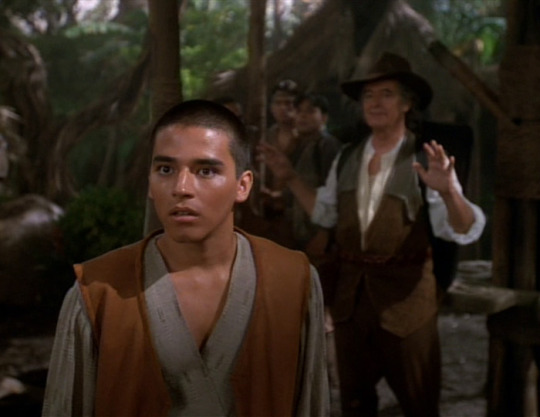
Star Trek has always had a race problem. In my twenties, I began to learn about the antecedents of the science fiction and fantasy genres - adventure fiction and Westerns, genres steeped in ideologies of Rule Britannia and manifest destiny. If Star Trek was originally pitched as “Wagon Train to the Stars,” then perhaps the aliens have always been “Indians.” But Star Trek also has a progressive streak that has lent itself to diverse casting. What does it mean when the same universe contains allegories for minorities and real-world minorities?
I have to admit I'm a sucker for a good science fiction allegory. As a kid from a mixed-faith background, I loved watching Worf negotiate his Klingon ancestry and human upbringing. (I only realized as an adult that the Rozhenkos are Jewish coded!) I'm not saying that Worf is great or perfect representation of multicultural identity, but there is something about allegory that can powerfully voice our lived experiences. (The trans allegory in the recent Nimona film adaptation is an exceptional example of this.)
As best as I can tell, the trick to writing fictional "races" and real racialized characters is one and the same - handling the cultures you're depicting with care, eschewing biased stereotypes in favor of nuanced, complex, informed worldbuilding. The showrunners of Voyager did not exercise care.
I want a Star Trek in which the characters feel rooted in real cultures, whether they’re alien or human. I want Harry Kim to have a cultural identity, and I want Chakotay to belong to a real-world Indigenous community. If science fiction is about curiosity, then I want white writers and showrunners who are genuinely curious about the stories they don’t have the expertise to tell—and who are willing to give space to those who do.
1/5 prize Vulcan orchids.
7 notes
·
View notes
Text
useless desires (Persistence of Vision, s2 e8)
I just realized I posted my drafts out of order! And skipped Persistence of Vision!! So sorry, but also what is time, etc.
"Persistence of Vision" could also be titled “kisses no one wanted to see on television.” There are so many of them! Voyager is a show that is fundamentally bad at romantic subplots, and this episode in particular seems determined to deliver awkward makeout scenes that literally no one asked for.
Truthfully I’m inclined to like this episode - it’s gothic, and it's about feelings, and those are both good things! (Season Two as a whole is strong in the area of feelings-forward episodes, even as it struggles with such matters as “plot.”)
We open with Janeway, modern career woman, losing her cool due to the pressures of command. The Doctor orders her to blow off some steam with a holo-novel, so we’re back to Victorian governess cosplay.
This show’s conception of self-care is so very nineties - Janeway is a leader, but she’s also a woman, which means that an essential layer in her Maslow’s Pyramid is “putting on a corset and getting snogged by a bargain-basement aristocrat.” The problem with the governess holonovel is that it invokes universalized cliches of gendered desire (bodice-ripper tropes) instead of drilling into what this character, specifically, would look for in a holonovel (my money is on lady doctor/cowboy romance, but I will also accept steampunk adventure, or pirates). Some women dig feeling feminine, but they also want to feel like themselves.

Soon Janeway’s repressed lady psyche, pushed to the brink, begins to spill out into ordinary life. When she dares to enjoy a coffee ice cream (instead of one of her inexplicable cups of soup), she begins to hallucinate. Mark shows up!! A ghostly dog barks!!!
I am usually one to try to get behind a canonical love interest - even if my shippy preferences lie elsewhere, canon relationships shed light on character. But man, I hate this jerk. No doubt real!Mark has many pleasant qualities that phantom!Mark lacks, but let's be real, dude has all the charisma of a bin full of pencil shavings.
Mark (and Mollie) have been on Janeway's mind; we know this because she gave their photo a long, plaintive look before trotting off to the holodeck. Now phantom!Mark declares that, quote, SOMEONE ELSE IS IN YOUR THOUGHTS NOW(!!!) As further evidence of her guilt, a hallucinatory Mrs. Templeton appears and jumps her.
Who the heck is someone else?? One is inclined to assume that we're being setting up for a Janeway/Chakotay romance arc - but it’s hard to feel certain this show isn’t fucking with us, making shippy promises it has no intention of keeping. It seems equally possible that Lord Burleigh is someone else and the writers truly believe that Janeway feels guilty for kissing holograms behind her fiance’s back.
At any rate, atmospherically backlit aliens have shown up; the rest of the crew starts hallucinating, seeing loved ones or, in B’Elanna’s case, a torrid romance with Chakotay?? (I am actually okay with these two as fwb, but their relationship is so fundamentally platonic that, again, it feels like the writers are just messing with us.) Mark shows up and kisses Janeway (gosh, two Janeway kisses in one episode, each one profoundly disappointing).
Only Kes is strong enough to resist these bankrupt conjurings of female desire. Her siren is a Tom Paris who needs to be rescued, which is actually a pretty funny and on the nose interpretation of what Kes is into. Overcoming her urge to engage in some hurt/comfort roleplay, Kes rescues the ship, Medusa-like, by using her telepathic powers to return the awkward to sender.
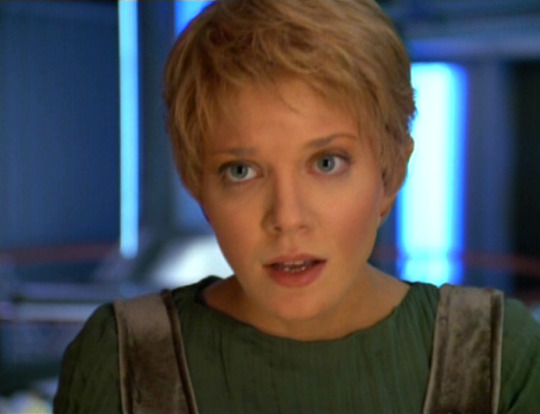
I enjoy this episode because it’s about women’s personal lives, even though the script seems extremely confused about what those personal lives consist of. Janeway and Torres share a very sweet “welp, that was awkward” scene at the end in which they resolve to be a little less repressed in the future.
Of curse, we can't possibly expect either of them to follow through with their vow; when it comes to nineties television, the richest texts are usually those below the surface. 3/5 surreptitious coffee ice creams.
24 notes
·
View notes
Text
in a thousand deliciously ill-advised ways (Cold Fire, s2 e10)
Around the time I watched “Cold Fire,” I read an excerpt from poet Maggie Smith’s memoir, which chronicled how, as a writer and primary caregiver to her kids, she found professional success incompatible with the survival of her marriage. “Please don’t,” she tells a friend who wants to send Smith's husband a picture of the line at her book signing. “It’ll just make everything worse.”
The piece made me so sad, the same sadness I feel every time I’m reminded that our culture is terrified of powerful women. We see this in our popular culture, with its recurring tropes of ungovernable female villains, and perhaps more insidiously, female heroes whose own power is their greatest threat. Men and boys are tasked to defeat external obstacles, but women are always struggling against ourselves.
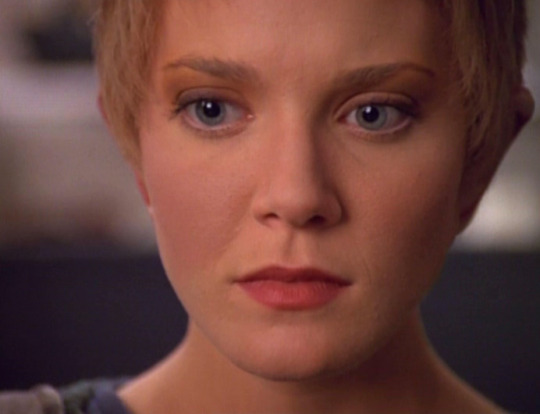
“Cold Fire” simultaneously evokes and dodges these themes of dangerous female power in a way that feels very squishy and contradictory. Kes gains access to “dark” Ocampan powers and has to overcome them, but the episode makes the empathetic choice to portray her journey as universal rather than as evidence of a personal failing. “Do not fear your negative thoughts,” Tuvok, Zen master, tells her in the final scene. “They are part of you. They are part of every living being, even Vulcans.” Even Neelix is on board with her self-discovery, earning a stamp in his underutilized “good boyfriend” passport for being genuinely excited about her personal growth.
As the episode opens, Tuvok is leading Kes through a frankly creepy telepathy session (aren’t there mindreading ethics?), when Voyager stumbles on a Caretaker-like array populated by Ocampa. Kes gets to play diplomat to the colony, a fun expansion of her skillset.
Suspiria, the female Caretaker, reinforces the “lawful male / chaotic female” vibe of the episode - while the Caretaker we’re familiar with played divine patriarch to Kes’s people, Suspiria has settled the Ocampa in her own array and gifted them with psionic powers. The whereabouts of the second Caretaker has been one of the chief ongoing mysteries of the show, but Suspiria is frankly very boring - a vengeful, irrational goddess who takes form as a little girl. (Star Trek seems to have a penchant for “tiny blond girls as otherworldly aliens.”) The episode closes with her return being teased, but of course we never see her again.
Under the tutelage of Tanis, who serves as emissary of Suspiria’s tower of Babel, Kes nearly kills Tuvok with her developing psychic powers. Soon after, she nukes the contents of the airponics bay and, doing so, discovers the joy of wielding death and destruction. This is where the episode veers into silliness for me. Jennifer Lien is a great actor, but I can’t buy her performance, because the script doesn't feel, to me, rooted in character.
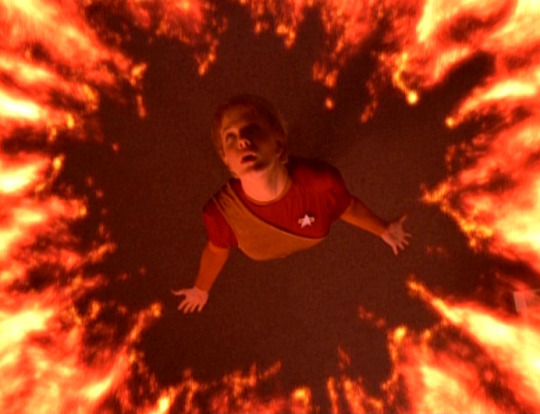
Parables about power often make this mistake: “it’s intoxicating!” “It’s like a drug!” But people chase power (and intoxication) for extremely personal reasons. Kes is a character driven by intellectual curiosity, and while she’s totally capable of leaving her friends behind for a sufficiently compelling adventure, I can’t see her being tempted to align herself with an amoral weirdo like Tanis. If people are going to write stories about dangerous women, they should at least take a moment to ask why a woman might want to be dangerous.
Happily, Kes doesn’t have to give up her powers; she uses them to save the day and resolves to find balance under Tuvok’s guidance. But I’m not sure this show ever finds the plot when it comes to Kes’s abilities and what they mean to her. At the end of the day, it’s just kinda an incoherent mess.
2.5/5 dark impulses.
15 notes
·
View notes
Text

4 notes
·
View notes
Text
ballet of the unhatched dicks (Partuition, s2 e7)
Gosh, season two is a real bummer. I know I will find joy in this show again, but “Partuition” is not it.
Before we get into it, red alert, turn on the klaxons, it’s Janeway hair watch! I genuinely thought I’d lost my mind when I started the episode and found a season two Janeway bob on my screen. It’s not the best ever iteration of Janeway with short hair, but they were trying a thing.
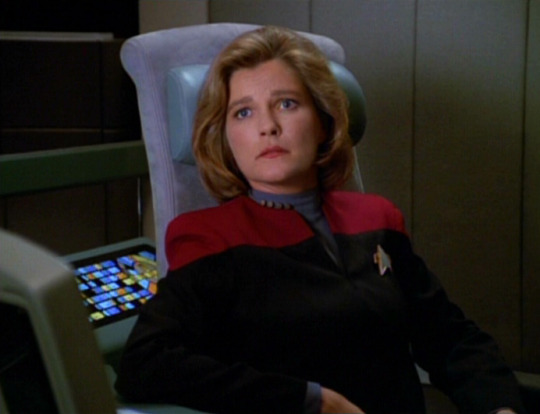
The bob is (spoiler) gone by the next episode. Let us not contemplate the in-universe logistics of Janeway’s disappearing-then-reappearing mane and just appreciate that movement, of a kind, is happening on the hair front.
Anyhoo, the rest of this episode is nonstop yikes on bikes. Tom realizes he has a crush on Kes, Neelix gets jealous, and our boys are stranded on a dangerous planet to work out their feelings. There’s also a baby dinosaur question mark?
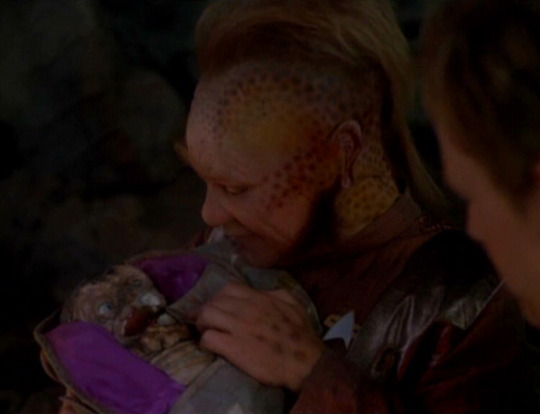
I don’t hate jealous Neelix as a story thread. Narratives about toxic relationships are important! What I hate hate hate is the way this show repeatedly fails to center Kes or her feelings. This episode is wall-to-wall men having opinions about Neelix being a bad boyfriend, when it could be a story about Kes coming to terms with having a bad boyfriend. It’s so bad, y’all, and I want to launch it into a nebula.
The emotional immaturity of Neelix, Tom, and indeed the script itself, comes out in the high school tenor of the comedy. Like, there is a food fight. Tom acts like a teenager who, quote, “can't let myself be alone with her” (barf). The writers are like, “teehee, aren’t men the WORST,” but I am genuinely offended on behalf of actual men, who are adults and don’t need to be told their bad behavior is cute or funny or whatever.
Nor do we get counter-programming in which smart, capable, emotionally intelligent Kes realizes she is too good for this nonsense. Instead the Doctor delivers an APPALLING monologue in which he states, “You should consider it a high compliment. Throughout history, men have fought over the love of a woman.” To my ear Picardo is struggling with this dialogue, which is supposed to be drily witty but springs from a “boys will be boys” attitude that doesn’t make sense from our dispassionate, take-no-crap EMH.
The solution to our love triangle, obviously, is for Tom and Neelix to be stuck in a proverbial elevator together, working out their jealousy issues as if they are characters in The Iliad fighting over female chattel. We get a garbled science fiction plot (I had a hard time suspending my disbelief on this one, with its reliance on old wives' tales about baby birds not being removed from nests, and a grown man proposing to leave an alien infant to die). The only nice thing I can say is that the baby bird alien is actually kinda cute? I dunno. I like what I like.
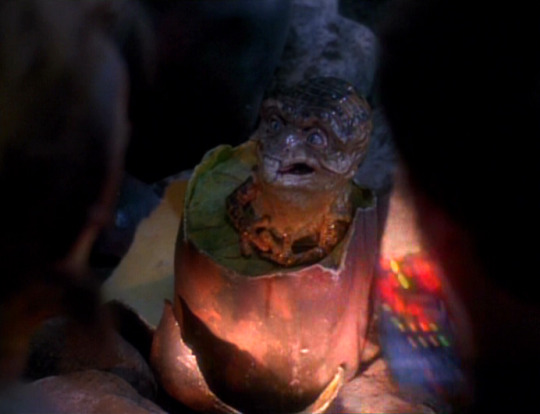
As our boys discuss their feelings for Kes behind her back (yuck), Neelix figures out how to care for the baby alien (to which Paris says, “You're not its godfather. You're its godmother." Holy crap, this show is written exclusively by men who, when they watch their kids, call it “babysitting”).
Paris and Neelix make up, but there's something crucial missing, a scene that every romantic comedy fan knows and loves: the grovel. The grovel is what makes battle-of-the-sexes narratives work. In romantic comedies, men are never forgiven until they show that they know what they did. Both of these men have much to apologize for, but Kes never hears a single apology. The nicest line we get is Neelix’s, “I don't pick Kes's friends for her,” but he says this to Tom.
Apparently when the patriarchy asks itself, “how could we suck less and treat women better?” the answer they come up with is: “we could be bros?” “we could agree to share?” It is inane and offensive and I want to throw it into the garbage and then set the garbage on fire.
SO BAD. 0.5/5 strands of Alfarian hair pasta.
#star trek#star trek voyager#janeway's hair#neelix is the worst#seriously throw both of these men out
4 notes
·
View notes
Text
she's not your satellite (Twisted, s2 e06)
I peeked at reviews for “Twisted,” and apparently people do not like this episode! I guess I understand why - it is literally 45 minutes of people wandering the corridors, exchanging increasingly tense dialogue as they contemplate their deaths. What can I say, I enjoyed watching it. I am partial to a drawing-room novel where nothing happens, and in Star Trek, the corridors are the drawing rooms.
“Twisted” opens with Kes’s birthday party. She is turning two (underage even in dog years). This poor young woman is having such a bummer of a birthday! The party is at Sandrine’s, undercutting a sweet moment of found family with several rounds of holographic sexual harassment. A bad time becomes worse when Tom gifts Kes a locket, raising Neelix’s hackles. To be fair, it is a genuinely bizarre gift - all of the lockets I’ve received in my life were gifted to me before the age of ten - and only heightens the narrative confusion around Tom’s “just friends” intentions toward Kes.
As soon as Neelix starts quietly freaking out, Janeway inserts herself into the conversation. What is this lady doing? She compliments the necklace and explains to Kes how lockets work, stoking the drama with the same energy with which she micromanages a science experiment. Is she oblivious? Does she think she is helping? Why is everyone being so weirrrrd?
I will pause to appreciate Neelix’s genuinely beautiful cake. I am so tickled by the conceit that people in space have space themes for their birthday parties, though I suppose it makes sense for Kes, who is excited to celebrate her first birthday on Voyager.
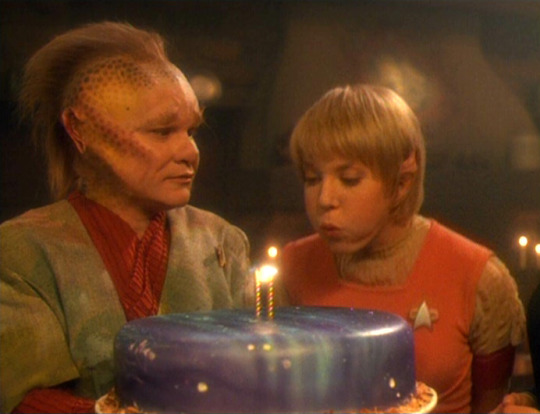
One distortion wave later, the layout of the ship begins to warp. Attempts to leave the holodeck continuously route the crew back to Sandrine’s (truly, hell). So much of Star Trek takes place in these interchangeable corridors, so the ship’s geography becoming the obstacle of the week is very fun! And cost-saving!
Unfortunately this is a Bad Neelix episode, in which we are subjected to the latest eruption of Neelix’s obsessively jealous ruminations. Neelix broaches the subject with Chakotay and gets the absolute worst advice: Chakotay explains that fear and love go hand in hand, but isn’t love worth the risk? Perhaps this is peak Star Trek: the suggestion that you can platitude your way to healthier thought patterns. In Chakotay’s defense, Neelix is asking the wrong questions; right now he needs help with his behaviors, not his feelings. Soon after, the two are separated by the diverging corridors, and we get the funniest moment of the episode, in which Chakotay calls for Neelix in the same plaintive tone that one uses to summon a cat.
The episode finally gets some momentum when Janeway is disabled by some 90s-era CGI, resulting in a power vacuum. “Twisted” was originally filmed for Season One, so we get a charged argument between Chakotay and Tuvok about how to respond to the distortion. Chakotay pulls rank, and Tuvok’s decision to cede to him feels like a big character moment - this is the guy who broke the Prime Directive behind Janeway’s back, after all. He’s accepted Chakotay as his superior, and he’s willing to set aside his own self-regard to play by the rules.
Chakotay’s plan fails, so Chakotay, in turn, puts his trust in Tuvok and decides to ride out the progression of the wave. Certain they are going to their deaths, everyone hugs it out, in a stiff upper lip, Starfleet way. To be specific, they hold hands, clasp shoulders, or in Tuvok’s case, sidles up close to Janeway without actually touching her. These people, honestly.
Of course, they don’t die. The wave was just one of those uncanny alien encounters that Starfleet crews are wont to have, and they depart with extra data about the Delta Quadrant. Maybe that’s why I like this episode: the ending just feels really… nice? It’s certainly a departure from the usual Voyager arc, where hard lessons are learned and sacrifices made. To quote the Ninth Doctor, “Just this once, everyone lives!” Our crew of weirdos with emotional deficits gets to have their cake and eat it too.
3/5 Jibelian fudge layers.
4 notes
·
View notes
Text
Every episode of Star Trek, as summarized through Am I the Asshole verdicts:
👽 alien race: YTA
🖖Starfleet: NAH
😬 audience: ESH
4 notes
·
View notes
Text
a-vested development (Non Sequitur, s2 e5)
SORRY (not sorry?) FOR THE TITLE.
I had such vitriol toward "Non Sequitur" when I first watched it. It was a terrible episode - surely the worst yet of the series. Season Two could only get better from here!
Well, having watched the rest of Season Two, I am here to inform you that I was dead wrong on that count. Still, this one is pretty stinky.
The premise of this episode: Harry ends up rewriting reality (?? unclear) and finds himself in a universe where he and Tom Paris don't accompany Voyager to the Delta Quadrant. But this is a bad thing(??) so he has to do a reverse Gilligan's Island and get things back to the status quo!
This is a genuinely fun premise, and I welcomed the chance to spend some time on Earth. Unfortunately, the writers really flubbed the storytelling. Harry's personal life has no texture! He has zero chemistry with his girlfriend, his job is boring, and he seems to have been grown in a vat insofar as his emotional connection with Earth goes. It's not hard to buy his decision to return to Voyager and reunite with his crew, but the fact that he's so eager to leave means the whole episode is utterly without stakes.
But heyyy, fellow queers, check out this sweet sign for TRANS FRANCISCO, the only way to travel!

Harry's reaction to "halp I have rewritten the timeline" is to be real weird and secretive, as if Starfleet doesn't encounter temporal anomalies on the regular. His behavior is totally confusing - wouldn't he welcome the opportunity to tell Starfleet and the crew's loved ones that Voyager has survived?
Scrambling to give Harry a reason to return to Voyager (the news that his friend went in his place doesn't feel particularly impactful), the episode also reveals, It's a Wonderful Life-style, that this is a bad timeline. Tom Paris is a total fuckup without his time on Voyager prodding his character arc forward. Harry needs to rescue his bestie!
Love is still in the air - it takes a single cutting remark from Harry for Tom to instantly change his ways, show up in San Francisco with floppy arm-guns pummeling, and help his pal steal a spaceship. Unfortunately bad!Tom is even more irritating than reformed!Tom. Not only are we subjected to his terrible personality, but we're assaulted with mid-90s Future Fashion, including the most lamentable vest I've ever laid eyes on. Sob.

This episode should have knocked it out of the park, if not for this bummer of a script. It feels genuinely disrespectful toward these actors that they are given so little to work with, particularly in a character-driven episode that dramatizes the central premise of the show we're watching.
1.5/5 Vulcan mochas, extra sweet.
2 notes
·
View notes
Text
Cut the crap, Hamlet! My biological clock is ticking, and I want babies NOW! (Elogium, s2e4)
I get the sense that "Elogium" is an episode that viewers find embarrassing. Maybe I am just projecting my adolescent feelings onto the internet consensus. It is certainly somewhat hamfisted, but it also belongs to a genre that we might call "reproductive health body horror" and, like... I'm kind of into it?
The premise of the episode is, of course, that space alien radiation causes Kes to enter estrus. (Unaccountably the Ocampan word for this is "elogium," which is a real Latin word for something else. Okay guys!)
Let's get the "bad science fiction watch" out of the way: Ocampan reproduction makes no sense from a population biology point of view. If an Ocampan couple can only reproduce once, they need to have a multiple pregnancy to maintain population levels, not the single child Neelix seems to be contemplating. (Also, having kiddos at age five means that grandparents would often not be around to participate in elogium rituals, as the Ocampan lifespan is 9.)
Additionally, it's hard to know what to make of the revelation that Kes hasn't reached "puberty" yet. The show seems to be decoupling intellectual/emotional maturity from reproductive capacity, but we are left with some very awkward questions about Kes's relationship with Neelix. Like, sex aside, what does romance mean for a young Ocampa? This show doesn't dare ask the question, such is its fragile allo/amatonormativity.
Still, I thought Jennifer Lien's performance was strong - emotional and a little weird while still respecting her character's personhood. In an important scene (one that frames her relationship with the Doctor as a parent/child one, thank god), she questions whether she wants a kid and makes a self-affirming decision that I loved to see, though I wish it had been dramatized more fully.
And, like, occasionally, having a uterus does make you feel like you're in a dirt-eating fever dream. I don't know if the alien physiology metaphor will work for everyone but I sorta dug it.
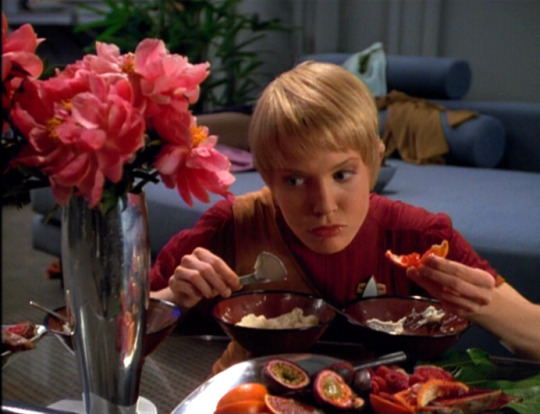
Neelix is, of course, trash in this episode, with the return of his jealousy subplot, his dreadful gender essentialism, and the extremely cliched portrayal of him as a reluctant father. His "should I be a dad" dilemma is fundamentally relatable, but instead of showing a real dialogue between a couple that's been avoiding the question, he and Kes start the episode with gender normative beliefs (she wants a baby, he wants adventure) and switch positions after some extremely light self-reflection. They're never on the same page, and they don't make the decision together.
On a happier note, this one's shippy! The episode starts with Janeway and Chakotay having one of their ridiculous whisper-conversations on the bridge. People are (shock!) hooking up and they need to decide what to do about it. This is very weird and silly because both Starfleet and the Maquis seem cool with fraternization, and they're 70,000 light years from home. Surely there is not even a conversation to be had, other than a need for some policies and mental health supports around breakups? But we do get Chakotay asking his extremely impertinent question about Janeway's personal dating plans, and the introduction of the Janeway chastity vow.
It makes sense for Janeway not to date crewmembers, especially in light of her commitment to Mark (this episode was originally slated for season one). But what about Chakotay? He is also everyone's boss?? I think that even in the 23rd century people should still not date their bosses, but this show does not seem to know this and it bums me out, particularly because of the gendered double-standard here.
(Mollie watch: Janeway is looking at a Mark/Mollie photo in the final scene. The show wants us to believe she's pining for her man, but honestly I think the baby talk is just making her miss her doggo. In my head canon Janeway is the type of person who responds to all child-rearing anecdotes with stories about her dog.)
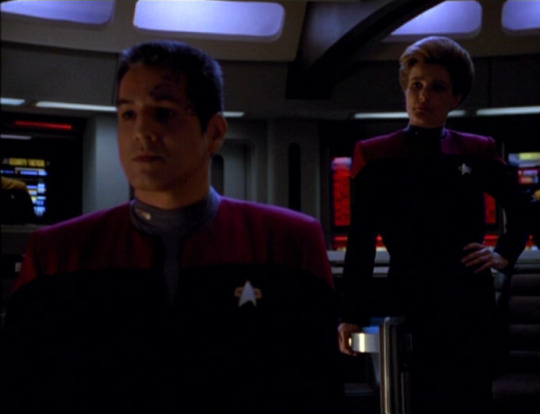
Ensign Wildman, and her pregnancy, are also introduced, and we get another J & C scene where Janeway affirms the crew's right to have kids (hashtag reproductive justice) and contemplates the possibility of becoming a generation ship (whoa, slow down, lady! Like, of all the ethical questions about having kids while space marooned, assuming they'll continue your mission for you is quite a leap!)
Tuvok's line "It appears we have lost our sex appeal, Captain," sums this one up: despite all the innuendo, this is a very unsexy episode, and I think that's by design. Family planning is often unsexy! I just wish it had gotten a little closer to contemplating the real issues that emerge from our dual natures as people with bodies and people with agency over those bodies, and the push and pull of figuring out what that means for us, individually and in relationship.
3/5 bowls of mashed potatoes with butter (a Terran delicacy!)
11 notes
·
View notes
Text
computer, delete Paris (Projections, s2 e3)
This review will be a short one, simply because this episode is such a hoot! If you're in the mood for Star Trek and wish to be persuaded that early season Voyager has something to offer you, put on "Projections." You will have a good time.
This episode is a holodeck episode and a reality-bending romp in one. It plays around what we would now call simulation theory, leaning into all the trippiness that entails. The story beats are familiar, but work because they're grounded in character. For the Doctor, metaphysical questions hit differently. After all, if you're a simulated person, what does "reality" mean? How do you choose between solipsism and the external world?
Here, the weirdness is played for laughs, while still giving the Doctor his due. After all, existential questions are pretty funny at their root. To quote the sages, "How strange it is to be anything at all."
This feels like a script that trusts the actors, from Barclay's delightful guest role (slightly manic, with an edge of incoherence) to the Voyager crew's slightly stagey presence (Janeway's battle hair is epic) to the Doctor's amazing physical comedy. The food fight in the mess hall is genuinely my favorite scene in the show thus far. I seem unable to locate a still image of the Doctor's somersaulting slither beneath a table, which just goes to show that if this is all a simulation, God the Scientist is sleeping on the job.

My only complaint is that I did not need the fictional Kes romance here, even if the real Kes is not at all skeeved and finds it hilarious. The writers believe they can get away with a certain amount of this nonsense because "she's an alien!" but she is such a young woman and no amount of on-screen gravitas is going to make us forget that.
Occasionally this show really gets it. 4.5/5 dented Talaxian saute pans.
3 notes
·
View notes